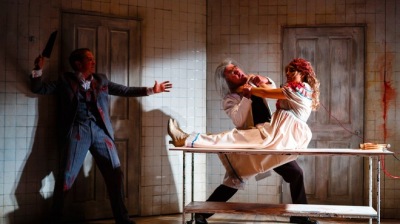Saying Carl Grose’s Grand Guignol, currently playing at the Southwark Playhouse, is perfect for Halloween is a huge understatement, as well as a disservice. Bloody, gory, funny and twisted, it has you snort-laughing through your nose and then checking if any blood came out. It has the innocent unpretentious naffness of 19th century travelling shows, yet it starts getting to you, because “actors, playwrights, lunatics” are all “imminently fascinating”, especially when there is no line between them, blurred or otherwise.
For all its upfront silliness, it’s knowingly – but not annoyingly – smart, and surprisingly incisive. More importantly, it’s about creativity and the theatre, which means I was bound to love it with a love that knows no bounds. Give me a play within a play, a wink behind the scenes, a seedy part of town with a company of actors – and I am happy as pig in shit. Which is the point: it’s unselfconsciously colourful, yet playfully tender. Continue reading





